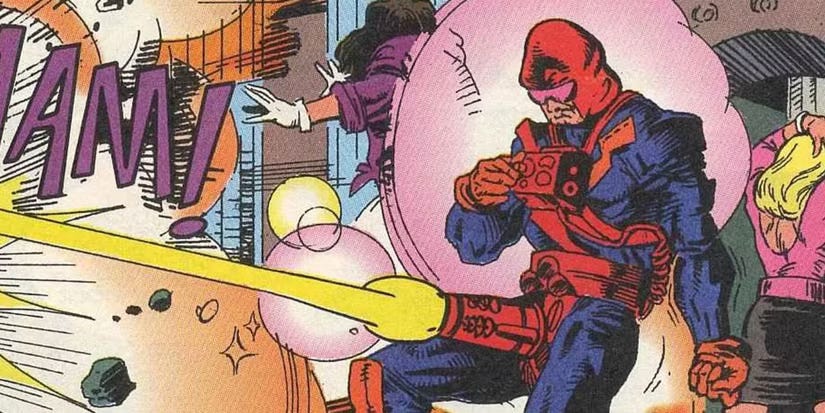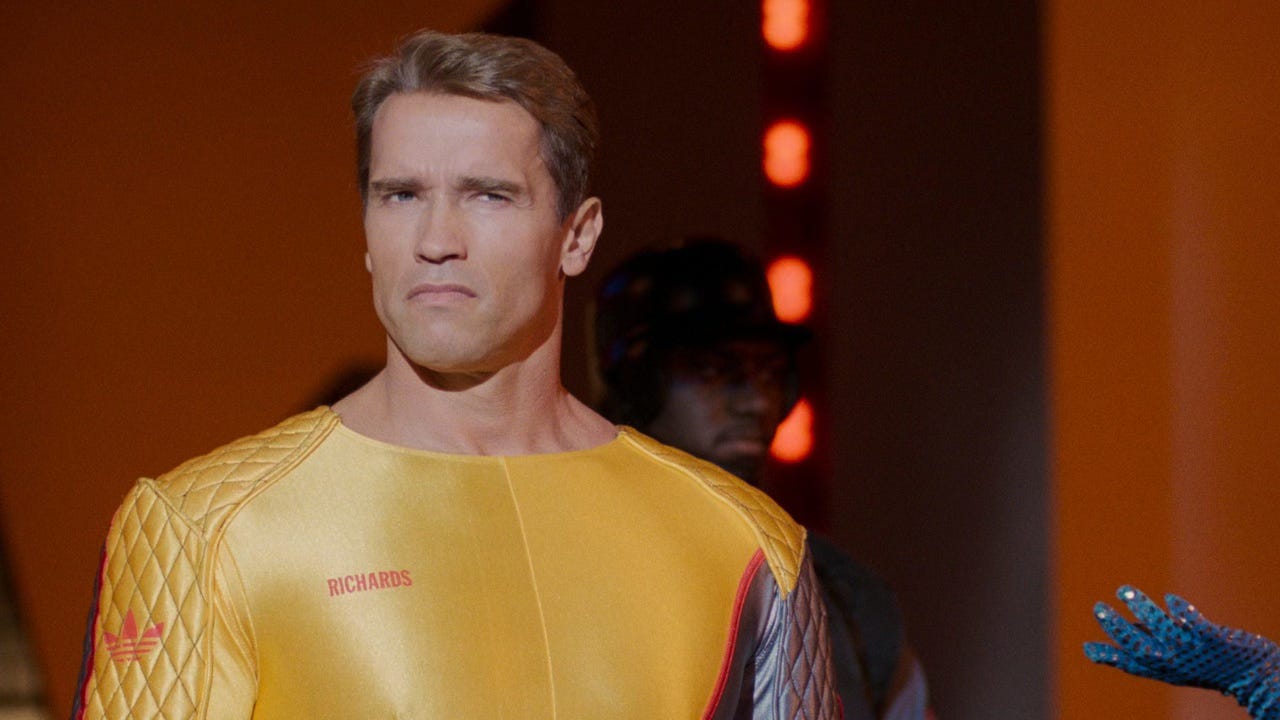Running Man (1987) Suggests a Future America That's Both Outrageous and Sadly Familiar
Revisiting the original film with the remake now in theaters
A couple of weeks ago I randomly threw on The Running Man (1987) while riding a stationary bike in the morning. That was necessary because riding a stationary bike is inherently boring. This may sound crazy but I would 100% rather run on a treadmill. Unfortunately, ours is broke-ish and pushing it beyond 3.5 speed is a formula for the kind of disaster you see on America’s Funniest Totally Not Staged Home Videos.
I could run outside but it’s November in Michigan and cold air and I do not get along. I’ve tried wearing a gator mask but that fogs up my glasses. Also: trying to breathe through a fabric that’s meant to be semi-impervious to air is not a good time. It’s a whole thing.
So: The Running Man.
It was only afterwards that I realized my accidental timing was impeccable—the Glen Powell-helmed remake hits theaters this week. I plan on going to see it eventually. It looks fun, and I’m a fan of Powell. Though I didn’t love his two most recent high-profile films.
The remake keeps the basic premise but jettisons the dystopian trappings. Or maybe it just masks them in a way that feels familiar and not futuristic. Powell competes because he needs money for his sick daughter. I don’t know if it’s supposed to occur in America 2025, but it could. The new The Running Man is less like a deadly version of American Gladiators and more like if John Wick was a newb who was being hunted across the globe. Cool idea. Can’t wait to see it.
If you’re tempted to rewatch the 1987 film before you check out the new hotness, let me stop you at the door. It’s not a good movie. At all. It’s schlocky and goofy. Arnold Schwarzenegger has never met a pun he doesn’t like; the only knock against Predator is his terrible one-liners. (At one point, he impales a dude to a wooden post with a knife and tells him to stick around. C’mon.) In The Running Man, his dialogue is almost all puns. (Not really. I’m exaggerating for effect. The point stands.)
The gladiators who hunt Arnold are an assortment of dime store villains. WWF by way of Mad Max and Saturday morning cartoons. The most ridiculous comic book villain ever is a guy named Codpiece, who uses an enormous phallic barrel to further his evil aims. His backstory is that a girl in his school told him he was too small, which he took as a slight against his manhood. Ridiculous, but Codpiece has more pathos than any of the dudes chasing Arnold.

What is interesting about The Running Man—the original—is the dystopian future it imagined for us. Here’s the film’s opening exposition:
By 2017 the world economy has collapsed. Food, natural resources, and oil are in short supply. A police state, divided into paramilitary zones, rules with an iron hand.
Television is controlled by the state and a sadistic game show called ‘The Running Man’ has become the most popular program in history. All art, music, and communications are censored. No dissent is tolerated, and yet a small resistance movement has managed to survive underground.
When high-tech gladiators are not enough to suppress the people’s yearning for freedom…
More direct methods become necessary.
The film then shows us these ‘more direct methods.’ Arnold plays a military helicopter pilot—perhaps the single goofiest thing in this movie—who’s ordered to fire upon a crowd of civilians peacefully demonstrating because they’re starving. He refuses. Long story short, he ends up competing on the Running Man, because the footage — the military records their operations, presumably because they also want to be TV stars, or probably actually to control the narrative — is doctored to make him look like a raving lunatic. Which, given the character is played by Arnold Schwarzenegger, isn’t that difficult.
One of the themes commonly explored in the 80s was the ability of media to distort and control reality. Even the cartoon G.I. Joe got in on the action; I’m slowly rewatching it and was recently shocked at an episode where Cobra hijacks the narrative by taking over TV stations and uses them to push alternate facts. How very prescient, especially for a show that exists solely to sell action figures.
This was a sub-genre of the evergreen ‘evil, faceless corporations’ genre. It being the 80s, media as a force of antagonism was often approached through a lens of cackling villainy (see also: G.I. Joe). There was no nuance. It ran the gamut from media executives hellbent on being the biggest TV station to a complete and callous disregard for life in service to ratings, as we find in The Running Man.
The film’s antagonist is a game show host (played by Richard Dawson, an actual game show host and real creeper; we’ll come back to that) who derives legitimate power from the show’s popularity. That seems outlandish on the surface, but I think we can draw a pretty straight line from there to news entertainment personalities who hold enormous sway over large parts of America today.
The experience of watching the 1987 film is one of reconciling two possible Americas: the one imagined 30 years ago, and our actual everyday reality. There are obvious, notable differences. We have not (yet) slid fully into an authoritarian state. Resources are still available. Freedom of speech and expression remain. Sorta. The most powerful man in the world is not a game show host; he’s a reality TV star.
At the same time, the power of media and its ability to deflect and distract, if not outright deceive, is a very real problem. As is our embrace of screens—be they TV or phones—as the window through which we experience the world. And our preferred medicine to numb us to all the suck. Who doesn’t whip out their phone when they’re bored for 10 seconds? Even if it’s to read a book, we’re no longer comfortable with boredom or being alone with our own thoughts.
I started re-reading Ready Player One—on my phone, actually—another story in which everyone is crushed under capitalism’s jackboot. As fun as the futuristic, pop culture-obsessed story is, let’s not forget that it’s set in a world where people have so little to live for that they spend their lives roaming a virtual world. As in: not real. Much I as love the idea of a fully immersive VR experience, one where I can wield a lightsaber and drive a DeLorean—and believe me, I really, really do—there’s something so sad and vacant about the idea. It’s the same emptiness I felt after grinding a video game to unlock meaningless achievements, which awarded equally worthless points to my profile. As though life has a scoreboard and winning and losing can be so easily tracked.
Growing up in the 80s, there were two ways of thinking about the future.
Things are gonna be great. Flying cars and hoverboards.
Things are gonna suck. Nuclear winter and starvation.
Surprise! It’s been neither.
In comparison to those two possibilities, the future has been rather mundane and normal. Apart from the notable exception of the internet, in the macro life looks little different than it did 30 years ago. We still drive places and buy things and eat food.
TV—in this case, I’m broadening the definition to include anything you watch on a screen—has grown exponentially. Not just the sheer ubiquity of options, but in its reach. It has become the arbiter of truth, and given rise to the Trump movement. Social media, influencers, reality TV stars—it’s only possible because we love watching other people. We’re all dirty little voyeurs at heart. So while the idea of little old ladies cheering as people get mauled to death might seem outrageous, is it really?
The future-looking films of the 80s imagined a world so desensitized to violence—thanks to the corrupting influence of TV—that people no longer feel any moral ambiguity or discomfort in watching someone get killed. That we would lose the ability to distinguish fact from fiction because it’s all entertainment in the end. That screens ultimately dehumanize us. (The culpability of the very films prophesying such a future in the creation of that very outcome was largely sidestepped, because entertainment.)
Watching the glorified bloodshed, I was reminded of when I’d accidentally stumbled onto the subreddit r/CombatFootage. It was during the early weeks of Russia’s attack on Ukraine and I, like a lot of people, was looking for information about the war and hope for Ukraine’s chances. Per the name, the subreddit is a place to see and share actual footage of the war. As in, people dying, in near-realtime.
Though I want to see Russia crushed and Putin removed from power, I was very uncomfortable with how people cheered the violent, often visceral deaths of young soldiers as though they were watching a sporting event. This isn’t a fringe, snuff film equivalent of a community—the subreddit has 1.8 million followers, many of whom view the war as a kind of gladiatorial theater best enjoyed from the comfort of a screen thousands of miles from the frontline.
Speaking of gross.
So Richard Dawson is in this movie. According to Wikipedia, he was an actor, but I only know him as the skeevy host of Family Feud, who kissed every single female contestant, married or not, willing or not. Not even the kids were safe.
Hmm. Where have I heard that before?




Can't wait to not watch the insipid remake.
Before "Family Feud", Dawson played Corporal Newkirk on "Hogan's Heroes".